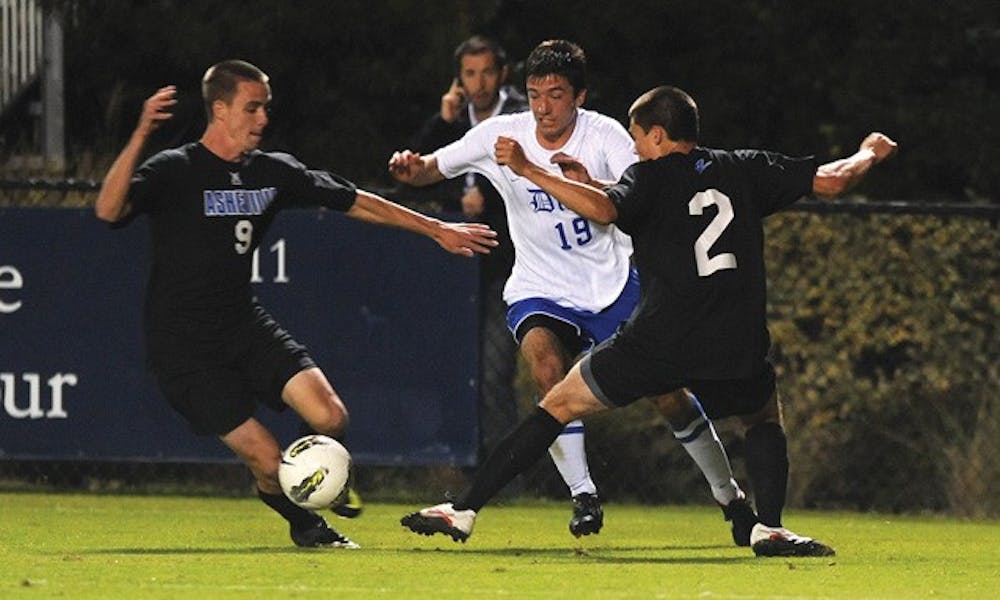Duke’s offense has been plagued by slow starts to games this season. Just over three minutes into last night’s contest, junior Andrew Wenger made sure that would not be a problem.
The Blue Devils cruised to a 3-0 victory against UNC- Asheville at Koskinen Stadium, led by Wenger’s early goal and two from senior Chris Tweed-Kent, who notched the first multi-goal goal game of his collegiate career.
The offense controlled possession from the beginning of the game, preventing the Bulldogs (3-10-3) from generating any dangerous chances. Wenger set the tone for this early, receiving a pass from Nick Palodichuk and taking the ball past a defender to put one home on the ground from 15 yards out.
After the goal the offense continued to rack up opportunities, with ten shots in the game’s first 25 minutes. Despite the abundance of chances, Duke (8-6-1) could not convert any of them and lacked the urgency to put the game out of reach quickly.
“It’s important that we had a good start tonight,” head coach John Kerr said. “But we wanted to get another couple goals earlier, and it didn’t happen…. They take the foot off the accelerator and think it’s too easy.”
Chris Tweed-Kent eventually broke through, however, in the half’s 32nd minute, placing home a bobbled ball to increase the lead to two. Substitute Joseph Pak fed a well-placed cross in from the right edge of the field, giving freshman Nick Palodichuk the first chance at it. After his attempt missed, Tweed-Kent put home the bouncing ball.
The Blue Devils finished the half with 13 shots—nine of which were on goal—compared to just three for UNC-Asheville. Twenty minutes of play elapsed in the second half by the time the Bulldogs registered their first and only shot on goal for the contest.
The second 45 minutes were largely similar to the first, with Duke controlling the ball and racking up shots in spite of sloppy offensive execution. Again, it was Tweed-Kent who found the back of the net, this time after receiving a pass in the box from Wenger. He then dribbled it past a defender and the goalie, placing it in from point-blank range.
“I was just itching to get on the scoreboard, and once you get one, you start feeling good and finally another came,” Tweed-Kent said. “But I think it’s a testament to the fact that we kept the ball a lot more [than previous games] and did a good job pinging the ball around.”
Although the Blue Devils came out victorious, the win was costly due to its physical nature. No injuries occurred, but Sebastien Ibeagha was one of three Duke players to receive a yellow card, garnering his fifth of the season.
According to NCAA rules, he must sit out the team’s next game, a conference match against Virginia Tech.
“[It is] extremely frustrating,” Kerr said of Ibeagha’s suspension. “I’m not happy.”
Overall, five cards were given by the referee, who received loud criticism throughout the game from fans and both coaches. Tensions ran especially high when Ibeagha and midfielder Jonathan Aguirre’s were handed cards within 30 seconds of each other, giving UNC-Asheville two quick free kicks.
The match was a big turnaround for a Blue Devil defense that had allowed six goals in the team’s recent two-game losing skid. Goalie James Belshaw needed to make only one save, a testament to the team’s defense against an opponent that Kerr said was better than its record indicates.
“They were up for it—Asheville had a good result early in the season when they took UNC to overtime,” Kerr said. “They weren’t here to just make up the numbers, they were here to play.”
Get The Chronicle straight to your inbox
Signup for our weekly newsletter. Cancel at any time.

